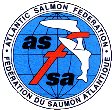Leading by Example, the United States Hosts North Atlantic Governments
Published 06-04-07
Submitted by Atlantic Salmon Federation
BANGOR, ME- June 4, 2007-An international review group has given the United States a perfect score for their implementation plans to conserve their native wild Atlantic salmon. The United States, Norway and England and Wales led the pack of 18 Nations that comprise the North Atlantic Salmon Conservation Organization (NASCO) and are gathered in Bar Harbor, Maine, June 5 to 8th, to discuss plans to save the species in North America and Europe.
The review reveals various degrees of inadequacy in the implementation plans of 15 other NASCO member Nation, from failing to relate actions to agreements to simply not submitting. The NGO community urges top scorers to push these nations to explain themselves, and to undertake rapid revision and improvement of their plans.
"The challenges to survival of wild Atlantic salmon in the United States are great," said Andy Goode, V.P. Operations, Atlantic Salmon Federation (U.S.), "but at least we are on the right track to restoring our endangered populations and the international community has recognized and acknowledged this. Our salmon populations met just 6.4 % of their minimum sustainability targets in 2006, up from 4 % in 2005."
"The United States' commitment," continued Mr. Goode, "is reflected in its recovery plan for the endangered populations in eight Maine rivers, and the support, financially and morally, for the renewal of the Penobscot River, a $50 million dollar project that has been supported by the State of Maine and the U.S. Federal Government."
Chris Poupard, Chairman of the Non Government Organizations (NGOs) accredited to NASCO, who sat on the review group, expressed disappointment over the poor preparation by many of the countries of their implementation plans for salmon management. Basically, most national plans did not reflect conservation actions to which all NASCO Parties have agreed.
Mr. Poupard said, "It's apparent that many NASCO Nations have not yet bought into the renewed vision and strategic plan they adopted at NASCO in 2005 to be more accountable and transparent in how they reach internationally-agreed goals. Most countries have simply failed to tie in their national actions to agreements they have made to restore and protect habitat, protect wild salmon from the impacts of salmon aquaculture, and implement effective management and regulations."
Tom Grasso, Director of the International Fisheries Conservation Program of the World Wildlife Fund US, said, "The NGO community was instrumental in convincing NASCO Nations to adopt a new approach that is based on practical, accountable and transparent action. The implementation plans were meant to be the vehicle to do this. This initial outcome to the attempt to "give NASCO more teeth" is disappointing."
Mr. Grasso concluded, "NGOs ask the United States, Norway and England and Wales to inspire other member countries to meet the vision of NASCO's 'Next Steps' to strengthen the organization. We hope that this international review will motivate all member countries to implement transparent and meaningful salmon conservation policy, with timetables and commitment to action against which progress can be measured."
For further information, please contact:
Peter Mumford 902 488-5155 (cell) or Muriel Ferguson 506 469-0414 (cell)
The Atlantic Salmon Federation (ASF) is an international non-profit organization that promotes the conservation and wise management of wild Atlantic salmon and their environment. ASF represents 7 regional councils that have a membership of 135 river associations and 40,000 people, throughout the North American range of the wild Atlantic salmon.
World Wildlife Fund (WWF) is the world's largest and most experienced independent conservation organization with 4.7 million supporters and a global network active in 96 countries. WWF's mission is to stop the degradation of the planet's natural environment and to build a future in which humans live in harmony with nature.
The North Atlantic Salmon Conservation Organization (NASCO) was established to promote the conservation, restoration, enhancement and rational management of salmon stocks in the North Atlantic Ocean through international cooperation. Member Governments are the United States, Canada, European Union (including England & Wales, Scotland, Ireland, Northern Ireland, Denmark, Sweden, Finland, France, Germany, Spain), the Faroe Islands, Greenland, Iceland, Norway, Portugal, and the Russian Federation. NASCO is an international body established under the Convention for the Conservation of Salmon in the North Atlantic Ocean, founded 1 October 1983.
Background information can be found at www.atlanticsalmonfederation.org
Documents include:
Canada Media Release
United States Media Release
Executive Summary on Implementation Plans and Results
Backgrounders on Implementation Plans
Canada
United States
State of the Populations "“ 2007

Atlantic Salmon Federation
Atlantic Salmon Federation
The Atlantic Salmon Federation is an international, non-profit organization that promotes the conservation and wise management of wild Atlantic salmon and their environment. ASF has a network of seven regional councils (New Brunswick, Nova Scotia, Newfoundland, Prince Edward Island, Quebec, Maine and Western New England. The regional councils cover the freshwater range of the Atlantic salmon in Canada and the United States.
More from Atlantic Salmon Federation

